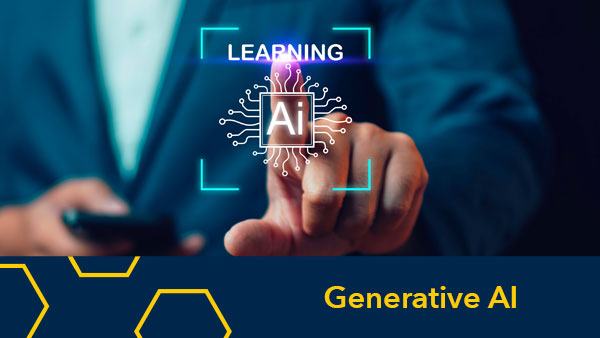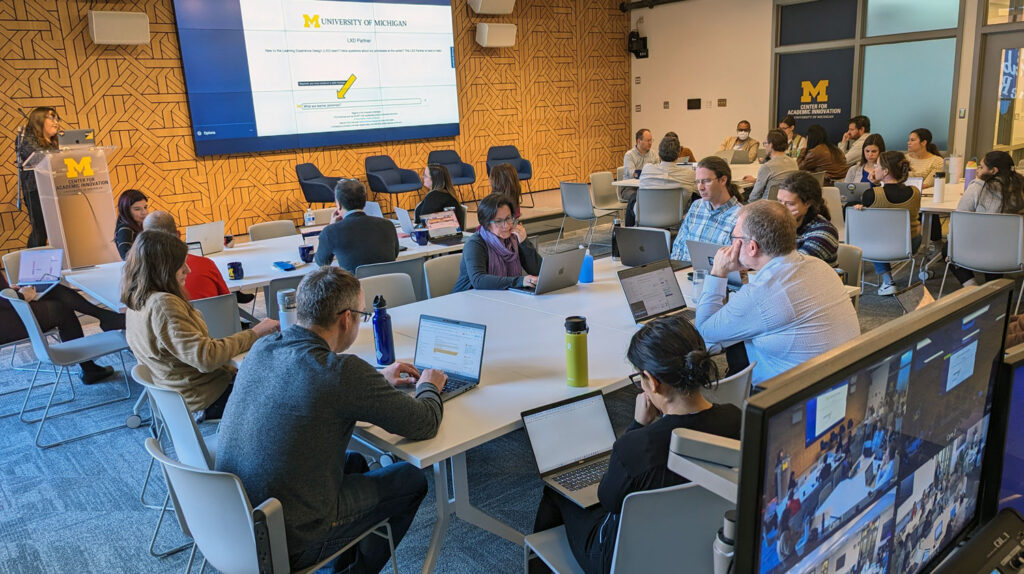
Sean Corp, Communications Lead
Nothing defined 2023 more than the seismic shift set in motion by generative artificial intelligence and large language models—the launch of ChatGPT serving as an inflection point. Debuting on the final day of November 2022, by January 2023, it amassed 100 million users.
The University of Michigan reacted quickly and is establishing itself as among the leaders in higher education in the exploration and use of generative AI technology. With the launch of Maizey, U-M GPT, and the U-M GPT Toolkit, U-M became the first university in the U.S. to deploy a suite of generative AI tools for use by faculty, staff, and students.
The Center for Academic Innovation has also been committed to examining AI’s potential impact on education, encouraged experimentation with AI tools, identified leading voices within U-M to help inform the general public about the ethical use of AI, and invited speakers from various industries to discuss how they see AI impacting their work.

“University leadership established a culture of embracing this new technology and thinking seriously about how it could impact education going forward,” said James DeVaney, associate vice provost of innovation and the founding executive director of the center. “We are inspired and motivated by the leadership of Provost Laurie McCauley and VP Ravi Pendse in ensuring U-M took the lead in these important efforts.”
Pendse is the vice president of information technology and chief information officer for the university and led the effort to develop the suite of generative AI tools through Information Technology Services.
“There is a tremendous need for careful experimentation with artificial intelligence technologies in higher education, and part of our role at the Center for Academic Innovation is to work across our innovation community to connect the wide range of expertise at U-M with global learners, organizations, and policy-makers,” said DeVaney.
Online Learning Opportunities on AI and Machine Learning
The center was one of the first higher education institutions to launch an online learning opportunity with the “ChatGPT Teach-Out,” which quickly became one of the most popular online learning events in the center’s history. More than 13,000 learners enrolled in the Teach-Out and a later update that covered a broader scope of generative AI technologies.
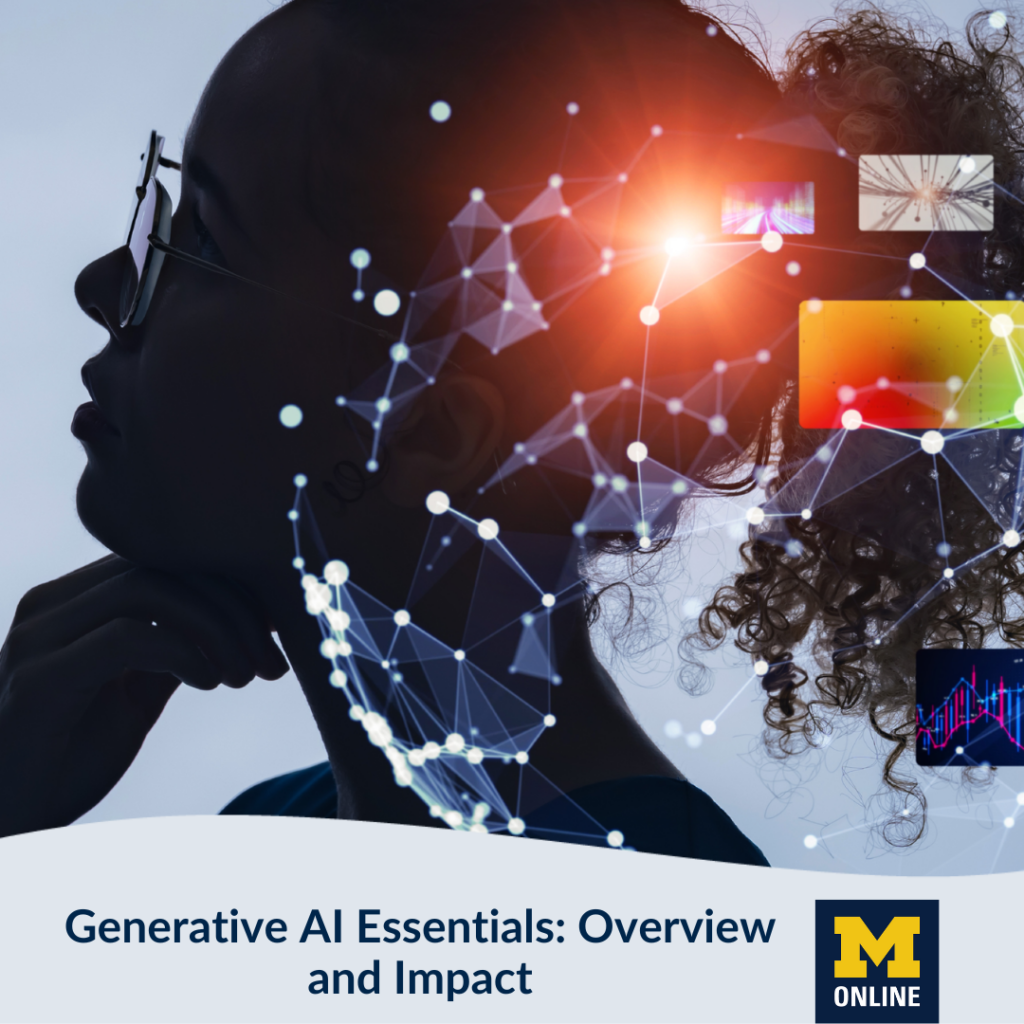
Later, the Generative AI Essentials short course launched. It gives people a broad overview of generative AI from various U-M experts and takes only a few hours to complete.
The online learning opportunities are a response to the explosion in interest in generative AI. To help share the wealth of educational information and resources found in U-M courses, there is an AI Collection on Michigan Online. The collection is home to individual videos, articles, and access to courses curated into thematic playlists.
For years, the center has partnered with U-M faculty to build courses that have sections focused on machine learning and artificial intelligence.
“Justice and Equity in Technology Policy,” taught by the Gerald R. Ford School of Public Poicy’s Shobita Parthasarathy, on how artificial intelligence can reinforce bias in policymaking, and how policymakers can ensure equity in public policy.
“Data Science Ethics,” taught by H.V. Jagadish of the College of Engineering, explores the ethical considerations of collecting and managing big data.
“Introduction to Machine Learning in Sports Analytics,” part of the five-course series “Sports Performance Analytics.” It explores how athletic data and machine learning can be used to predict athletic outcomes more accurately.
“Applied Machine Learning in Python,” part of the “Applied Data Science with Python” five-course series. Taught by Kevyn Collins-Thompson of the School of Information, it shows learners how to use Python to create and evaluate data clusters and build predictive models.
Next Steps in AI Education
The center is continuing to build on this foundation. It is actively working with faculty from eight of U-M’s schools and colleges on additional short online courses focusing on job skills and how AI could change the workplace. Through this effort, the center considered content that would be accessible to everyone, content relevant to managers and leaders, and content that aligns with specific roles, careers, and industries.
In January, the center announced an agile curriculum development initiative to launch more than 35 short online courses to help learners build generative artificial intelligence competencies and skills, with all courses launching in the Spring and Summer of 2024. The goal is to provide opportunities for people to better understand generative artificial intelligence and how it works and skill-building opportunities for using generative AI in specific professional roles.
Upcoming courses include ones targeted at software developers, lawyers, mechanical engineers, organizational leaders, and creatives.
“The University of Michigan is leading the way in AI education, and we received an inspiring level of interest from U-M faculty across disciplines who are eager to help others understand and apply AI knowledge and tools and help leaders adopt responsible AI practices,” said DeVaney.
The center has also published pieces on the Online Teaching website for faculty and instructional designers to consider how generative AI plays a role in teaching and learning. Published articles include potential uses for ChatGPT in higher education, foundational information on generative AI in course design, and using generative AI in crafting learning objectives.
AI’s Evolving Impact on the Higher Education
The center invited several top minds in higher education and online education to speak to leaders at U-M about how artificial intelligence is changing their business practices today and will change education delivery in the future.
“It is important to not only engage with this technology seriously and rigorously at the center, but it is critical for us to bring in outside perspectives from other leaders across industries to learn how they are exploring and using AI technologies in design, research, and business practices,” DeVaney said.
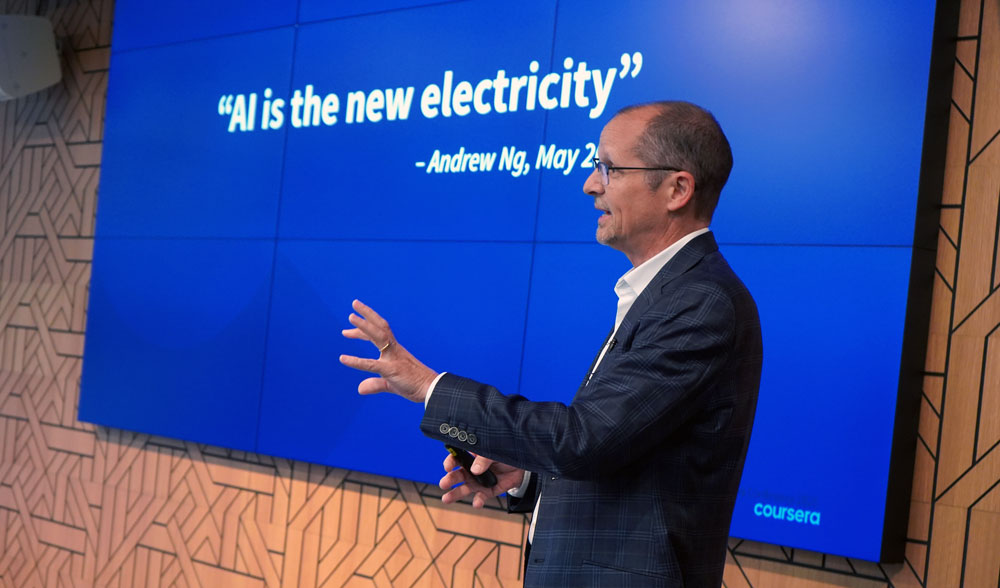
Jeff Maggioncalda and Marni Baker Stein of Coursera spoke about how they are already leveraging AI tools on the Coursera platform. Jeff Katzman, CEO of Noodle and the founder of The Princeton Review, discussed how generative AI tools could completely transform student support services and drive down the cost of tuition at universities.
Ben Castleman and Kelli Bird, both from the University of Virginia, presented research comparing human intervention vs. algorithmic interventions through the prism of academic advising as part of a series of online research talks hosted by the center.
U-M faculty, staff, students, and alumni gathered to engage deeply with these experts through the center’s Innovation Insight series.
CAI Using Generative AI
The center is also working to evaluate and build capacity within its staff to experiment with using several AI tools in its work. Educational technology developers are researching how to use generative AI in their existing educational technology portfolio and encouraging others to test new tools while creating content, correspondence, and data analyses.
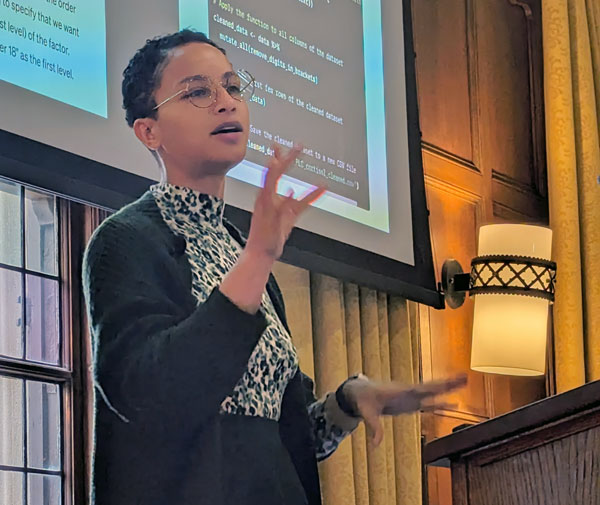
A generative AI task force was formed, and among the initial recommendations was the establishment of a long-term GenAI Council, an evaluation process for AI tools, and to engage with faculty on the development of generative AI learning opportunities. Following the task force recommendation, the center launched a call for proposals which then led to the development of more than 35 short online courses focused on foundational knowledge and industry-specific skills.
Once established, the GenAI Council worked to encourage the use of AI tools at the center while also ensuring matters of privacy, ethical use, and enhanced pedagogy. The council includes members throughout the center, and its charge is to advance our portfolio of AI learning experiences and tools leveraging AI to support our global learning community, identify opportunities for upskilling and expansion of expertise across our team, and to stay current on evolving AI issues and lead implementation, recommendation, and strategy related to AI at the center.
The council designed and facilitated a generative AI boot camp to 100-plus staff members in January. It led our operations team in developing documentation for training and evaluation for uses of tools in the future and engaging with vendors of various AI platforms for how they could potentially enhance teaching and learning in higher education.
Like organizations around the world, the center is looking into how generative AI can improve its work, and the center’s leadership team is taking seriously the potential for the technology to transform teaching and learning. Still, that requires careful consideration, experimentation, and evaluation which is helpfully coordinated through this Council.
“CAI has long been committed to creating a culture of innovation in learning at U-M. Part of effectively enabling innovation across campus is recognizing when our team needs to look in the mirror to see when we need to explore new skills and adopt new practices and ways of thinking. We also feel a deep sense of responsibility to thoughtfully use and evaluate these new technologies in order to do our part to ensure equitable access and to serve as a standard bearer for responsible AI use across higher education,” DeVaney said.


